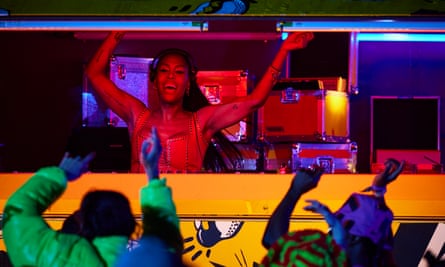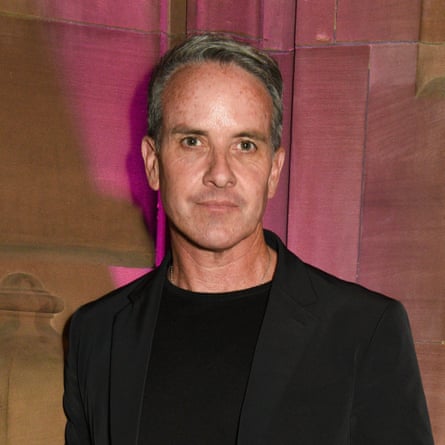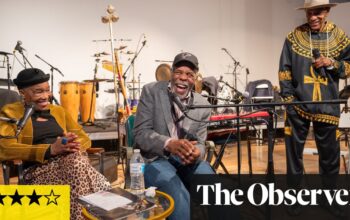W
The dance group Overmono has had a successful year as an underground rave act. They have had sold-out headline shows, an album on the charts, and a busy festival season with prime time slots. They even have three shows lined up for the new year. Surprisingly, one of the most sought-after tickets in the UK dance scene can be found in Australia.
Not only Overmono, but also many popular artists are performing overseas this upcoming year. In the past, every club in the UK would have a year-end celebration, with DJs playing multiple shows in one night.
According to 27-year-old Scottish promoter Nick Checketts, it was common for artists to perform in Glasgow and then travel to Edinburgh or Manchester. However, this year, many smaller promoters are avoiding hosting events on New Year’s Eve and some clubs are not open at all. Checketts personally would have considered hosting a show, but he is not confident in being able to draw a crowd and make it successful.
Steven Braines, one of the creators of the popular club event He. She. They., has also decided to skip this year’s New Year’s Eve celebrations. He notes that the typical behaviors of partygoers on this holiday have shifted significantly. Many are now opting for house parties, while others are seeking a bigger and more immersive experience. As a result, traditional clubs are facing a decline in attendance.

One of the biggest parties of the year will be a 24-hour livestream event held in a crowded Brooklyn warehouse. It will feature popular DJs Peggy Gou, Kaytranada, and Honey Dijon, and will be available on Apple Music. Live events for this party have already sold out, with 12,500 tickets sold for Wembley arena and 10,000 for Warehouse Project in Manchester. However, smaller club nights are suffering and experts believe that club culture is coming to an end.
According to Finlay Johnson of the Association for Electronic Music, ticket prices have increased and as a result, younger individuals are choosing to save their money and spend it on major events. This has greatly impacted the primary audience of smaller venues. Johnson also mentions that numerous popular UK artists are now traveling to places like Australia, Dubai, or Europe for end-of-year performances. Additionally, some artists will not be performing at all.

According to Sacha Lord, a night-time economy advisor in Greater Manchester and co-founder of Warehouse Project, this is an indication of what we can expect next year. He believes that traditional high-street nightclubs with carpeted floors are quickly becoming obsolete. Over the next 12 months, there will likely be numerous closures of large chain nightclubs, as there are ongoing issues within the industry.
Over the past year, 125 establishments have been compelled to shut down as a result of the escalating cost of living. According to Kelly Wood, the Musicians’ Union’s national organizer for live performances, the recent shutdown of beloved venue Moles in Bath serves as a dire cautionary tale.
Social media plays a significant role in decision-making for leisure activities. A recent report from Rekom UK, called the night index, revealed that nearly one-fourth of customers rely on TikTok to help them plan a night out. According to William Aspden, head of A&R at XL Recordings and manager of Overmono, the appeal of big events showcased on social media is much greater than that of smaller, less impressive gatherings. People want to be a part of these experiences with their friends and recreate the moments they have seen online.
Smaller clubs are being impacted by festivals purchasing tickets from the market. According to Michael Kill, CEO of the Night Time Industries Association, this year’s festival season was exceptional, and he believes that these large events, where multiple artists can be seen in one night, are a continuation of that success. He also notes that these festivals create a festival-like atmosphere in a venue, regardless of the weather.
Ignore the advertisement for the newsletter.
after newsletter promotion
The preference for big nights does not come cheap. At Wembley, first-release tickets started at £52; for VIP packages it was £104. At the Warehouse Project, tickets were £45 or more. Transport costs are rising too, with taxi firms on the cusp of being obliged to charge VAT on top of fares. “If a £10 journey becomes £12, it’s starting to get to a point where, through taxation, we’re creating a financially inaccessible environment for people who are already under pressure,” says Kill.
Additionally, establishments open late at night are facing challenges in attracting a younger audience, especially with 20% of individuals under the age of 25 opting to abstain from consuming alcohol.
The outbreak altered behaviors, resulting in a group of youths who prefer to stay indoors. According to Paul Rose, a DJ and host of the Not A Diving Podcast, instead of traditional club experiences, people now turn to livestreaming from home. Even rising artists like Yunè Pinku have expressed their dislike for the club scene, earning them the label “ravers who hate to rave” by Hunger Magazine.
Could this be the start of the decline of nightclubs? It seems that way. According to Rose, “Clubbing is no longer trendy.” She adds, “These things don’t last forever. Small clubs with great music are no longer the go-to spot.”
Source: theguardian.com


